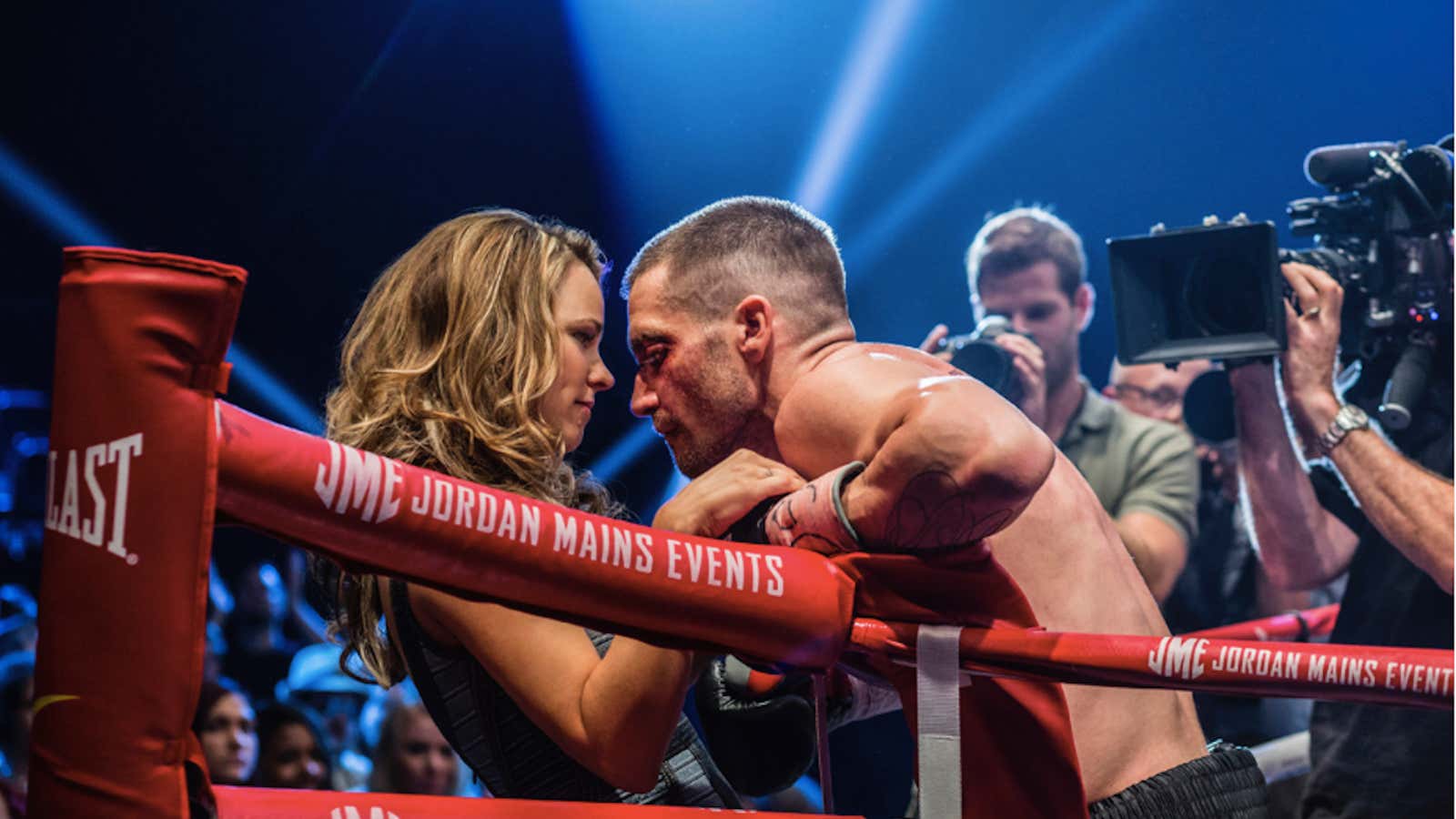A working-class white boxer with anger-management issues and a revenge narrative doesn’t sound like plot that is smashing many paradigms. And, in a lot of ways, the new Jake Gyllenhaal film Southpaw does exactly what you’d expect it to. There is tragedy, there is breakdown, there are earnest boxing training scenes, there is a white guy turned victorious hero. But while Southpaw takes care to land punches on all the familiar targets, it also ducks and weaves around masculine stereotypes in some unexpected ways.
A lot of this weaving involves the film’s central revenge narrative. In order to tear champion Billy (played by Gyllenhaal) down and give him motivation, his perfect wife, Maureen (Rachel McAdams) is senselessly murdered early on in the film. After her death, Billy’s life disintegrates as he undergoes a grief-stricken fallback to his working-class roots. Fortunately, his life is turned around by a magical black person in the form of boxing coach Tick Wills, played inevitably by Forest Whitaker. The comeback match is fought against Miguel “Magic” Cantu (Miguel Gomez), a Colombian boxer who was partially responsible for Maureen’s death. Like so many Hollywood movies before it, women in Southpaw are bloodily sacrificed on the altar of the central male character’s growth experience.
But while the revenge narrative is there, the film unusually goes out of its way to undermine and denigrate it. Billy’s fight against Magic is promoted as a grudge match, but Billy repeatedly, and convincingly, calls that premise nonsense. He’s not fighting for revenge; he’s fighting for money. His wife was also his business manager, and without her his finances have collapsed—he needs income so he can care for his daughter Leila (Oona Laurence).
More importantly, the film suggests that the logic of revenge, honor, and fighting for a woman is what destroyed Billy’s life in the first place. Maureen is killed after Magic insults her at a charity event. Despite his wife’s best efforts to stop him, Billy loses his temper, starts a fight, and Maureen is shot during the ensuing melee. The scene is mirrored in the final title match between Billy and Magic, when Magic again calls (the now dead) Maureen a “bitch,” and Billy goes into a rage, almost scuttling his chances at victory. In Southpaw, defending and fighting for your woman leads not to catharsis, but to idiotic posturing, death, and loss.
Southpaw, then, is a steroidal boxing film that critiques both male anger and the honor code that anchors it.
Anger and honor, though, are presented as symptoms. The real root of Billy’s problem is his inability to acknowledge his own vulnerability. In a lot of revenge films, vulnerability is the impetus for an orgy of bloodshed. But in Southpaw, vulnerability is tied to Billy’s unwillingness to take care of himself.
Boxers are supposed to get hit, at least sometimes. But Billy’s style of fighting involves almost no defense. Instead, he lets himself get punched again and again, until eventually his rage fuels a victorious counter-attack.
Billy’s anger, then, is tied to letting himself get hurt. He won’t take care of himself, and after his wife dies, won’t—or can’t—take care of his daughter, who is removed by family services after Billy hospitalizes himself in a drunken suicide attempt.
The arc of the film, then, is not exactly trauma/revenge. Instead, Southpaw is based around Billy’s efforts to become a good father, and a good man, by learning to protect and understand himself. His new and improved training regimen with Tick Wills mostly involves defense; keeping his gloves up, dodging punches, shielding his face. And those efforts are mirrored outside the ring as Billy cleans up, gets a job, stops drinking, and generally ceases to encourage reality to punch him in the nose.
Despite its insights, Southpaw is hesitant about abandoning its genre. Magic has to be gratuitously established as a bad guy, and the climactic fight turns out the way you’d expect the climactic fight to turn out. As a result, it’s not quite a great film.
Southpaw rejects the notions of swagger, honor and violence because it knows that men who risk their lives and their bodies to be heroes can end up hurting not just themselves, but everyone around them. In Southpaw being a man doesn’t mean being able to take a punch. It means being willing to value yourself and those you love enough to get out of the way.
